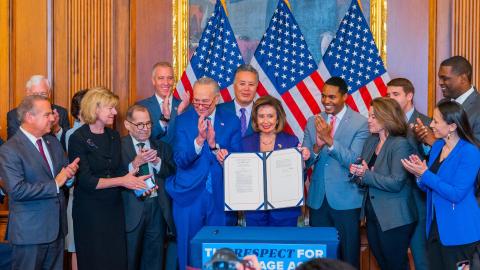Almost 200 members of Congress call on the Supreme Court to uphold bans on conversion therapy
Gay California U.S. Rep. Mark Takano, chair of the Congressional Equality Caucus, Rep. Ted Lieu of California, and Oregon U.S. Sen. Jeff Merkley, all Democrats, led 187 lawmakers on Monday in submitting a friend of the court, or amicus brief, to the U.S. Supreme Court in Chiles v. Salazar. The case challenges Colorado’s prohibition on conversion therapy, which bans licensed mental health care professionals from subjecting young people to the dangerous and discredited practice.
The case stems from a lawsuit filed by Colorado counselor Kaley Chiles, who argues the state’s ban prevents her from offering therapy to minors who say they want to change their sexual orientation or gender identity. Chiles claims the law violates her free-speech rights. Colorado, in turn, has defended its ban as a regulation of professional conduct aimed at protecting minors from harmful and discredited practices.
“Conversion therapy practices hurt kids, are widely discredited, and have no place in our modern medicine,” Takano said in a statement. “More than 20 states across our nation have already taken action to protect young LGBTQI+ people from the very real harms of so-called ‘conversion therapy.’ The Supreme Court must uphold these states’ laws and allow them to continue protecting young LGBTQI+ people from harmful and cruel practices that are opposed by every major medical association.”
Lieu, who authored the nation’s first ban on conversion therapy for minors as a California state senator, added, “This case is not about free speech; it is about scammers who pose as health professionals that use fake science to hurt kids. … These bans save lives – they must be upheld.”
Merkley called the practice “fraudulent” and “damaging,” noting, “The Court must reject this divisive effort by MAGA extremists to roll back safeguards against it. Let’s keep this cruelty out of our medical care.”
What’s at stake in Chiles v. Salazar
Colorado’s law, like similar bans in 23 states and the District of Columbia, narrowly prohibits licensed therapists from attempting to change a minor’s sexual orientation or gender identity. The law explicitly allows practices that “provide acceptance, support, and understanding” to youth exploring their identity. It does not apply to unlicensed religious counselors, although experts note that they also pose a danger to young people’s mental health.
Supporters of LGBTQ+ people say such protections are necessary because studies show conversion therapy is linked to higher risks of suicide attempts, depression, and anxiety. Survivors describe being subjected to behavior modification techniques, aversive therapies, and discredited psychoanalytic theories that falsely blamed parents for their children’s sexual orientation.
If the Supreme Court upholds Colorado’s law, states will retain the authority to regulate mental health care and protect minors from unsafe practices. If it strikes down the law, however, states would lose the power to restrict therapists from offering these interventions, even when research shows they can harm young people.
In June, the Supreme Court ruled in U.S. v. Skrmetti that states like Tennessee could ban certain medical care for transgender minors.
Oral arguments in Chiles v. Salazar are scheduled for October 7, with a ruling expected by June 2026.
Experts warn of life-or-death consequences
Mark Henson, vice president of advocacy and government affairs at The Trevor Project, underscored the dangers in an interview with The Advocate. “There’s a direct association with LGBTQ+ youth being exposed to conversion therapy and more than doubling the risk of attempting suicide. Further, those who have experienced conversion therapy are two and a half times as likely to report multiple suicide attempts in the prior year. … It’s enabling states to ban snake oil salesmen effectively.”
Henson also emphasized that the issue is about professional accountability, not freedom of speech. “This is about states and professions being able to regulate the practices and the standards. This should be a case that gets held up in Colorado, and further, there are over a dozen states that have very similar laws on the deck.”
He also criticized the Trump administration for rebranding conversion therapy as “exploratory therapy.” In May, the Trump Department of Health and Human Services issued a report that discredits gender-affirming care and promotes the practice Henson called “dangerous” under new terminology.
“That report wasn’t quite written in crayon, but parts of it were,” Henson said. “It is absolutely awful. It’s part of the upside-down attack on science and an attack on LGBTQ+ youth, which, sadly, we have become too accustomed to in this administration.
The Trevor Project has warned that the stakes are stark. In its 2023 report, “It’s Still Happening,” the organization documented more than 1,300 active practitioners of conversion therapy across nearly every state, with almost half holding professional licenses. The report concluded that, despite legal bans in many states, conversion therapy remains widespread and continues to exploit young people and their families, often under religious cover.
Advocates argue that the persistence of these practices underscores the need for state protections to remain in place. “Raising awareness is critical,” Henson added. “Parents who may not accept that their child is LGBTQ+ but still want them to live need to understand the harms. This is a life-or-death issue.”
Broad political and medical support
The lawmakers’ brief was joined by 167 members of the House and 20 senators, including House Democratic Leader Hakeem Jeffries, Whip Katherine Clark, Caucus Chair Pete Aguilar, Speaker Emerita Nancy Pelosi, and every co-chair and vice chair of the Congressional Equality Caucus.
Advocates praised the congressional show of support. “Conversion therapy has no place in any therapeutic setting. It is long-disproven, unethical, and deeply traumatic to the young people forced to endure it,” Jennifer Pike Bailey of the Human Rights Campaign said in a press release.
All major U.S. medical associations, including the American Medical Association and American Psychological Association, have condemned conversion therapy. According to the Movement Advancement Project, four states—Florida, Alabama, Georgia, and Indiana—bar local governments from enacting bans, while several others have partial restrictions in place.
